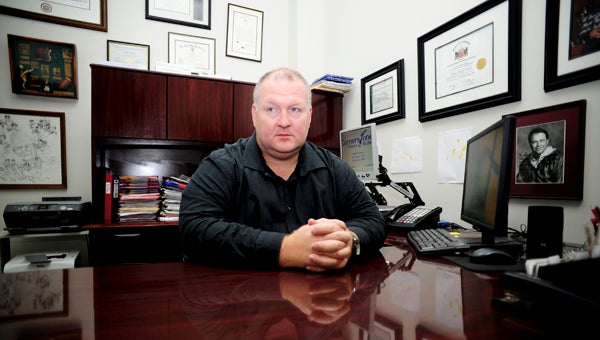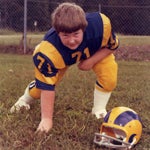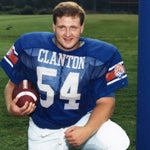Different kind of vision defines Baker
Published 12:07 pm Sunday, February 26, 2012

Today Barry Baker operates Cornerstone Fitness and Wellness with Amanda Giles. When he was in the third grade, he started having trouble in school. Doctors discovered he had macular degeneration, an eye condition that leads to vision loss.
No one would have blamed Barry Baker if he decided to feel bad for himself.
Baker was diagnosed with macular degeneration at age 10 and is legally blind. He can’t drive a car, and he relies on a cell phone that talks to him and a magnifier so that he can read.

Baker started playing sports at a young age. Above, he is shown in October 1981 playing for the Clanton Rams as a nine-year-old, the same year as his diagnosis of macular degeneration.
Baker’s vision is an obstacle he’s had to overcome his whole life. But a different kind of vision has defined him: his vision for his business, Cornerstone Fitness and Wellness, which serves as a testament to what can be done when someone focuses on what they can do instead of what they cannot do.
Ann Baker remembers how they found out her son had a problem. Barry was smart and loved school, so when he came home crying about a bad grade in Francis Dennis’ third grade history class, Ann was surprised but reacted as any mother with high expectations would.
“You obviously didn’t read what you were supposed to,” she recalls telling him, but Barry insisted he had tried. So Ann opened up a book and had Barry read it to her.
“He started reading, and it was just like…like he was just calling out words,” she said. “It didn’t make sense to him.”
Macular degeneration is a condition, typically found in older adults, that results in loss of vision in the center of the visual field because of damage to the retina. Those with the condition can especially have trouble recognizing faces. Usually, enough peripheral vision remains that a person can function normally, though tasks such as reading may require special devices.
Ann said the family was “devastated,” but was also determined to keep a positive attitude. Barry’s older sister, Adriane, would sit and read over schoolwork with him every afternoon.
“My parents were so great,” Barry Baker said. “They did everything they could to help me. I don’t know if I’d have reacted the same way.”

Baker continued to play sports throughout high school, including football and weightlifting. A little bigger Barry is above as a senior offensive lineman at Chilton County High School.
Barry had other help, too. He chose to attend college at Troy University partly because several high school friends—including his cousin Brad Moatts, Jason Bice and Britt Culpepper—were also going. Barry knew he’d need a way to get around.
“Anytime he needed to get somewhere, we made sure he got there,” Bice said. “But he’s that guy that makes you forget that there’s anything he can’t do. He’s so independent. He’s so motivated, and he doesn’t feel sorry for himself.”
That lack of self-pity is one of the most significant reasons behind Barry Baker’s success despite his poor vision. Ann Baker remembers a conversation with Dr. J. Randall Pitts soon after Barry’s diagnosis.
“Son, you can do anything you want to do, but you will never fly a plane or drive a car,” Pitts said. “The rest will be up to you.”
Barry responded, “I’ve always wanted my own personal chauffeur.” Pitts chuckled and said, “He’s won the battle.”
Attitude was a significant part of Baker’s success, yes, but so was knowledge, experience, a calculated risk—and, again, help from the right people.
After graduating from Troy in 1995, Baker worked for a rehabilitation clinic in Clanton. Word spread that the clinic was going to close, so Baker made a decision that would define his professional life.
Baker knew rehabilitation, but he also knew training. “Pre-habilitation,” he calls it.
“I thought we needed a place where we could do all that together,” he said. “We have some great football coaches around, but they’re hired to coach football, not rehab a knee.”
Baker went into business with Amanda Giles, who he worked with at the rehabilitation center. Giles specializes in the rehabilitation aspect of Cornerstone, while Baker specializes in the training.
“He just called me one day and said, “I’m thinking about going out on my own, and I would like you to be my partner,” Giles said.
Cornerstone has grown into one of the area’s most successful operations, employing about 30 people including full-time and part-time workers. About 1,000 new therapy patients visit Cornerstone in a typical year, and the business averages about 8,400 visits total for therapy. About 200 people a day come in to use the workout equipment.
Cornerstone has an indoor basketball goal and indoor pool, along with complete weightlifting, aerobic and therapy facilities.
“I had an idea, but I never thought it would be as big as it is,” Baker said. “We’re larger and we’re doing so many more different things than I ever imagined.”
Giles said Baker’s relationships with orthopedic doctors was key, as they would refer people to the fledgling operation.
Baker also credits the employees Cornerstone has had over the years. Vicky Martin is one of those crucial employees. She has worked as an insurance clerk since the business opened.
“They really care about people here,” said Martin, who also worked with Baker and Giles at the previous rehab clinic. “I remember the day Barry came in and told us what his vision was. He was so excited, and I was excited for him.”
Jason Bice’s son, Corbin, accounts for one of those visitors each day as he tries to further his youth sports career.
“I see Barry every day,” said Jason Bice, who was a groomsman in Baker’s wedding. “I trust him in everything he does. He’s just that kind of guy.”
Baker, 39, and his wife, Tara, have a 6-year-old daughter, Anna Kathryn, and 9-month-old-son, Bryce.
Baker relies on a special machine to help him read important business documents, he’s still “bumming rides,” as he calls it, and Giles will often read the menu to him when they visit a restaurant for business lunches, but he said he doesn’t spend much time thinking about his limitations on a daily basis. What would he change?
“I would love,” he starts, pausing to think about how he wants to phrase the words and gesturing with his hands for emphasis on this important point. “I’m going to get me a TV big enough one day because I would love to lay on the couch and watch TV.”
This story is part of PROGRESS 2012, which is on news stands Saturday, Feb. 25 through Monday, Feb. 27.






